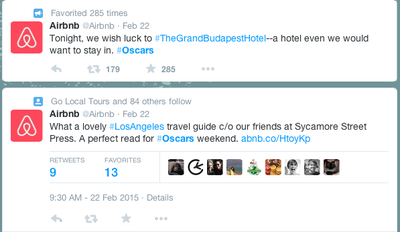March 2015, San Francisco
How Airbnb slunk in on LA and what that could mean for luxury travel
Luxury stays can mean big bucks, spa treatments and penthouse suites but it can also just mean ‘living like a local star’. Pamela Whitby reports
If you were in Los Angeles for the Oscars this past week, where would you have chosen to stay?
Perhaps at the Dorchester Collection’s iconic Pink Palace, maybe at the Hyatt Regency on the ‘fashionable’ west side or in a celebrity apartment sourced by Airbnb or Luxury Retreats.

The choice, it seems, is limitless and with travellers becoming more demanding, better educated and increasingly internet savvy, their desire to get the best, most relevant deal for their budget is growing apace.
It’s true that for the super rich, budgets are irrelevant but according to the Dorchester Collection’s Ana Brant, Director, Global Guest Experience & Innovation, often luxury guests value time far more than money.
Time that may well be better spent ‘living like a local star’ - in an Airbnb apartment!
Like the product itself, Airbnb approaches marketing in a fun, quirky and thought-provoking way. Two years ago, for example, it launched its ‘Hello LA. We’re Airbnb’ campaign which involved a range of pop-up activities to engage the city’s local communities with celebrity-designed, bookable pop-up listings and contests.
This week the peer-to-peer firm used its #Oscars Twitter feed, for example, to poke fun at hotels.

It’s clear today that luxury hotels are under real pressure to up the ante. But the big question is this: are they in denial about the threat to their business from disruptive forces like Airbnb, Luxury Retreats or even TripAdvisor?
If this rings your lobby bell, here are two things to consider.
# 1 Silo-style thinking will not buy glamorous guests
If disruptive online players are not on the agenda at board level in your organisation, you have a problem. Today many hotel businesses still operate in a traditional and hierarchical way where the most senior person calls the shots, says Ana Brant, Director, Global Guest Experience & Innovation at the Dorchester Collection. “This results in silo style thinking, and a lack of flexibility,” she says.
High-tech organisations, on the other hand, are designed to encourage collaboration and communication. This minimises organisational politics and increases the speed of decision-making so that teams can move more nimbly in a fast-paced environment.
It’s time we [hotels] start benchmarking those who do it well, such as tech companies
Ana Brant, Director, Global Guest Experience & Innovation, Dorchester Collection
While admittedly engineering a complete shift in culture is tough for any legacy player, it isn’t impossible. Thomas Cook, one of the UK’s biggest tour operators isn’t there yet, but it has taken significant steps as Marco Ryan, the group’s chief digital officer, told us in an exclusive interview earlier this month.
Brant recognises this and has this to say: “It’s time we start benchmarking those who do it well, such as tech companies. And the key is to understand ‘why’ and also ‘how’ they do it so well.”
#2 Resilience, proactive innovation and intelligent thinking are vital
When it comes to innovation, traditional hotel chains have been slow starters.
Take mobile check-in - the airlines got there first. When the online travel agents first appeared on the scene, ditto - the airlines were quick to establish Orbitz (which has, of course, now been acquired by Expedia) to address the threat.
What did hotels do? They sat on the fence and complained.
TripAdvisor is another bone of contention for many luxury hotel companies. Yet why has nobody created a copycat site for the luxury segment or, alternatively, united as an industry to work with the world’s biggest review site to address this gap?
When it comes to innovation, traditional hotel chains have been slow starters
For luxury hotels to thrive, the industry clearly needs to be more proactive.
“Hotels need to stop whining about OTA cost and start to understand how to better work these partners. Once that intelligence kicks in hoteliers will see a whole new world opening,” says Michael Levie, chief operating officer, CitizenM, a growing group of trendy hotels that positions itself as luxury for less in a mobile world.
Going forward, hotels will have to find better ways to be resilient and to become more proactively innovative.
For this they will need basic resilience, says Brant, which comes from truly understanding all competitors to your business - primary, secondary and tertiary.
Taking this a step further, competitive resilience comes from understanding potential disruptors to your business and working alongside them to create new and enhanced experiences for customers – more on this from the Dorchester Collection and others next week.
There will always be room in the market for luxury chains – some people just want a spa on site - but these are things that need to be addressed at board level for those that want to thrive.
Join us in San Francisco on March 23-24 to hear more about how to innovate in travel and from the Dorchester Collection
Next week look at specific steps hotels that hotel groups can take to improve the guest experience

